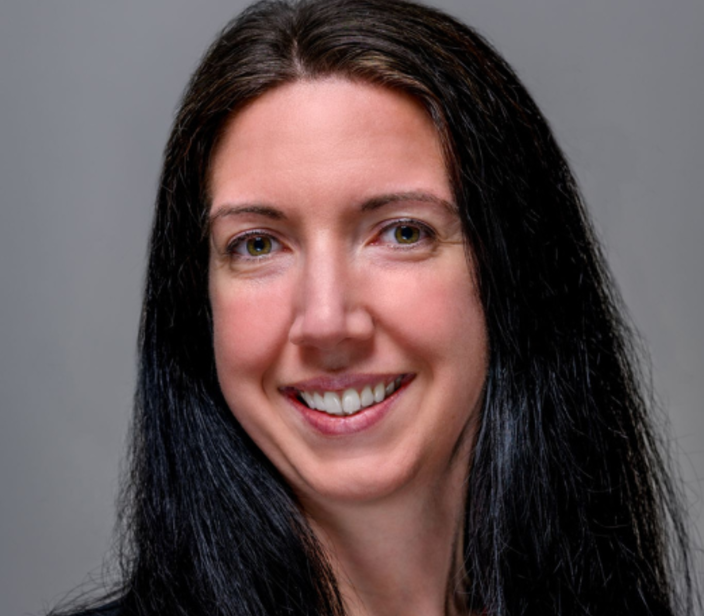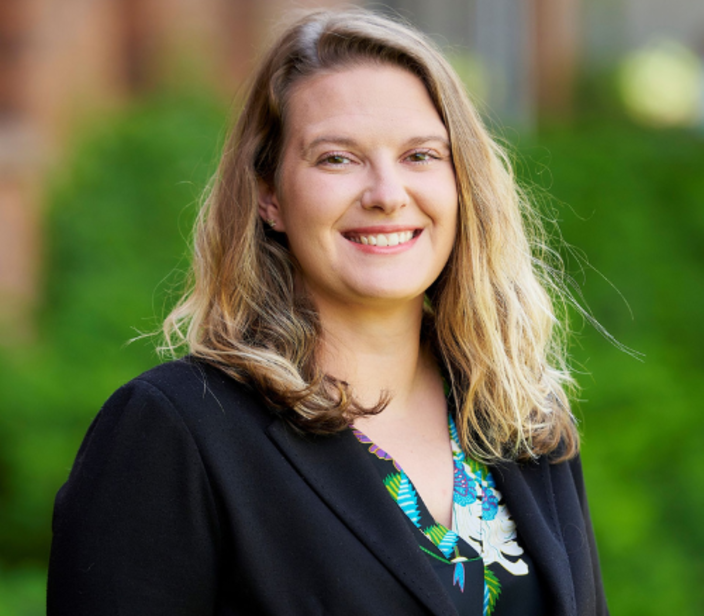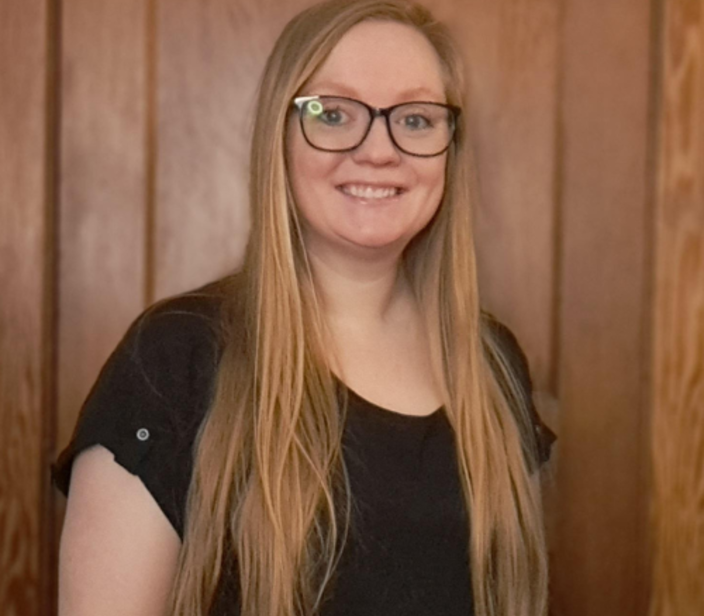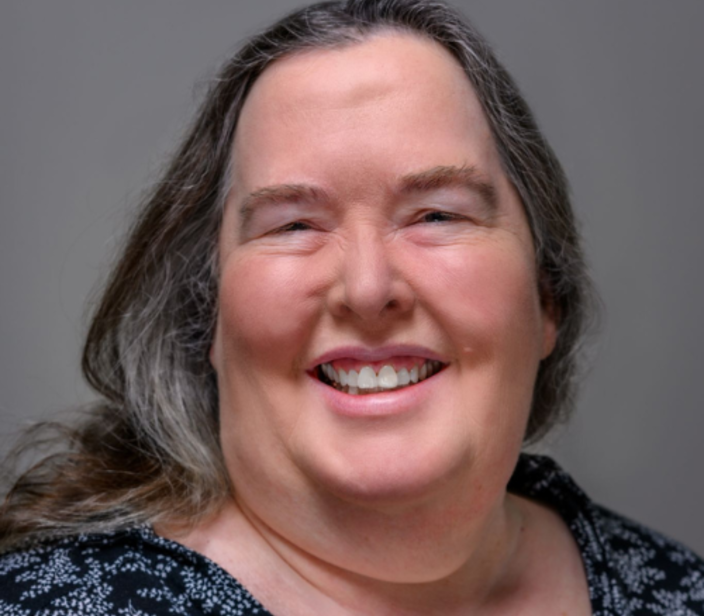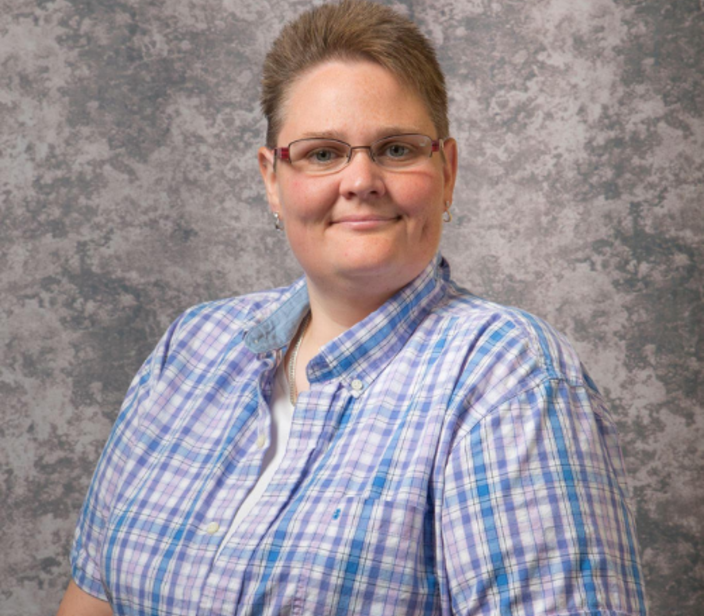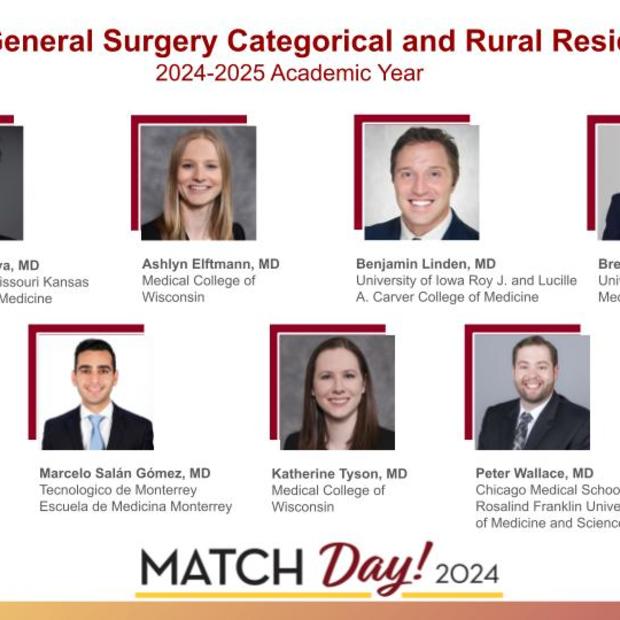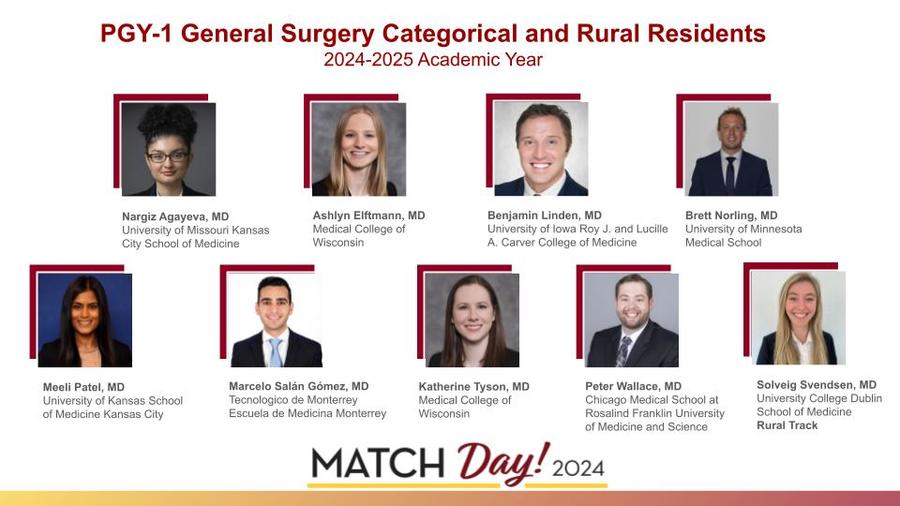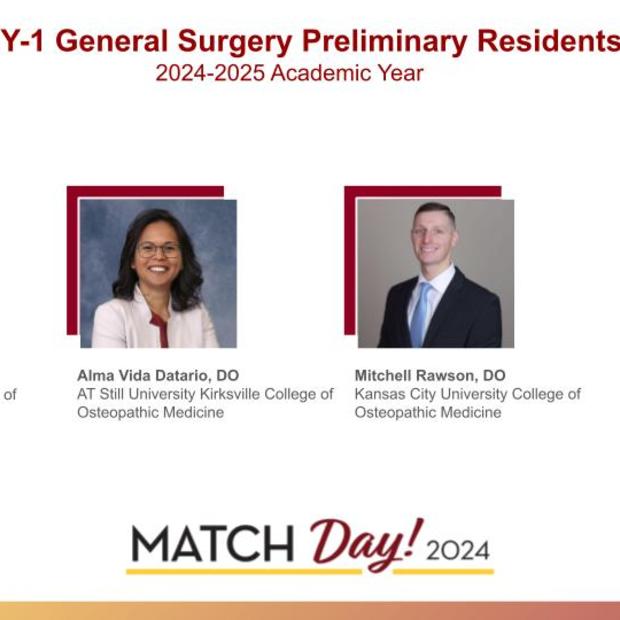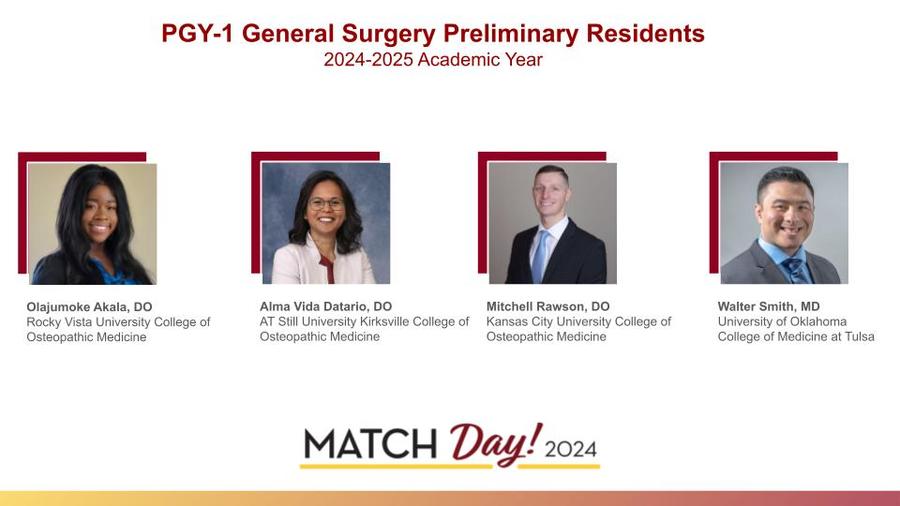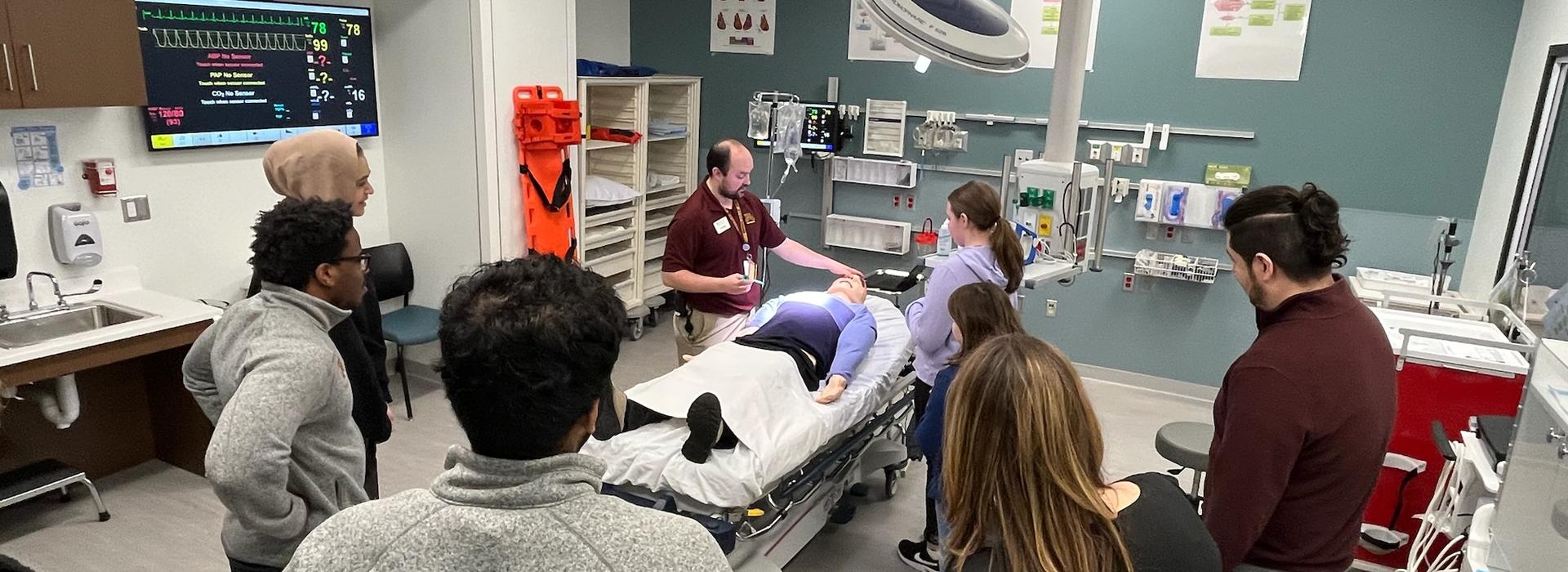
General Surgery Residency
Our fully accredited, world-renowned residency program in general surgery provides rigorous training both in the clinical setting and in the research laboratory.
Our dedication to the education of our trainees draws on an unparalleled legacy of surgical leadership (Wangensteen, Lewis, Lillehei, Najarian, Cerra, Dunn, Goldberg, to name just a few of our standouts) and an unrelenting dedication to education and innovative patient care.
Our goal is to help prepare you for a skillful and intellectually satisfying practice, especially in academic surgery. With an unwavering commitment to excellence in research to advance medical knowledge, our department trains the surgeon-scientists of tomorrow to deliver cutting-edge, compassionate care to patients and their families.
Browse this section (including the tabs below) for details on all aspects of the general residency program.

Director's Message
We have a rich history of training academic surgeons, which continues today. You will find detailed information about our fully accredited program and the interview process by exploring our residency web pages. We are committed to the development of each resident intellectually and professionally. In addition to a program that affords early operative experience, we have a dedicated curriculum to provide the tools to excel and prepare you for the next phase of your career. Our graduates are highly sought after upon completing their residency training and going on to the most prestigious fellowships in the country. We are extremely proud of our program. Explore our Surgery webpages to learn why candidates seek our highly competitive residency positions.
We take nine categorical residents annually through The Match, including eight traditional and one designated rural resident, and routinely fill our program within the top 20 of our ranking. I would encourage you to spend some time looking through all the features of our program on the website and exploring the details of the department through the other sections of our department website.
Our rural surgical training opportunity is at Essentia Health St. Mary's Medical Center in Duluth, MN. After completing the first three years in the Twin Cities, residents in the rural track will spend their fourth and fifth years in a structured environment focused on developing the clinical, surgical, and healthcare management skills needed to practice in a rural setting.
Thank you for exploring our program, and we hope you will consider us highly as you prepare for the upcoming interview season. Further, if you have specific questions, please contact me or our General Surgery Program Administrator, Sarah Erickson, JD.
Daniel Kendrick, MD, MAED
Program Director, General Surgery Residency
Assistant Professor, Department of Surgery
Meet the Surgical Education Team
Apply
We participate in the Electronic Residency Application Service (ERAS). You will need to submit your application documents electronically via your Dean's Office Workstation or, if you are a foreign medical graduate, the Educational Commission for Foreign Medical Graduation (ECFMG). The University of Minnesota accepts J-1 clinical visas in our training programs. The program does not sponsor H-1B or F1 OPT visas.
The required electronic application documents are as follows:
- Common Application Form
- Curriculum Vitae Report
- Personal Statement: Please include up to a 100-word paragraph detailing your interest in the University of Minnesota's General Surgery Residency Program. The Program will only consider those applicants with this additional information.
- Medical School Transcript
- Dean's Letter
- 3 Letters of Recommendation
- Photo (optional)
- United States Medical Licensing Examination (USMLE) Transcripts
- ECFMG Status Report (foreign medical graduates only)
- ACLS/BLS certification prior to the start of our training program
Your completed electronic application must be available to us no later than November 1, 2023, for the 2024-2025 training year. The Department of Surgery will invite a limited number of applicants for interviews. We will contact you regarding the status of your application once all of your application documents have been received.
Our interview sessions will take place on:
- October 31 (UMN Candidate Interview Day)
- November 14
- November 21
- December 5
Candidates applying for our rural track will have a second interview day in Duluth on November 15, 22, and December 6, 2023.
All of our PGY-1 categorical positions are filled through the National Resident Matching Program.
To apply to our General Surgery track the NRMP code is 1334440CO
To apply to our General Surgery/Rural track the NRMP code is 1334440C1
To apply to our General Surgery/Preliminary track the NRMP code is 1334440PO
To apply to our General Surgery/NeuroSurgery Preliminary track the NRMP code is 1334440P1
We look forward to receiving your application documents electronically. If you have any questions, please call the Surgical Education Office at 612-626-2590.
For more information on ERAS, select Electronic Residency Application Service.
Interviews
The interview format for those interviewing for the 23-24 cycle will be held 100% virtually.
Contact
Sarah Erickson, JD
General Surgery Program Administrator
surgedmn@umn.edu
Curriculum
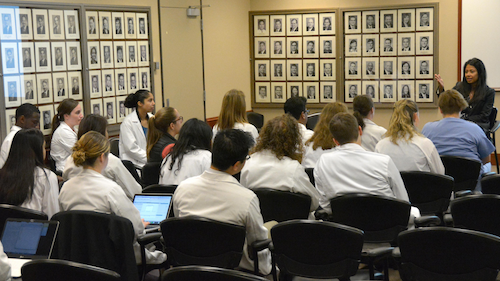
Our core curriculum lectures occur weekly as a part of our Tuesday morning education conferences from 8:45-9:45 am. Nurses at each site are encouraged to minimize all noncritical pages during this time.
The lectures follow a 2-year cycle of topics that encompass both basic science and clinical management of surgical diseases. Lecture topics are designed based on the Association of Program Directors in Surgery Curriculum objectives. The purpose of the curriculum is to highlight and reinforce the core concepts required for both the successful practice of surgery and successful board certification. Reading assignments are drawn from the ACS Surgery: Principles and Practice textbook, available online through the University of Minnesota Biomedical Library from any location.
Rotation-based Curriculum
On each rotation, trainees participate in a structured curriculum delivered administered via the Moodle2 platform. This curriculum attempts to complement the cases encountered in the operating room and clinic on that rotation while seeking to enhance resident learning. Each Moodle2 course is structured as follows:
- Orientation to the rotation
- Weekly bedside teaching rounds
- Electronically delivered lectures
- Assigned readings
- Weekly oral board format teaching sessions
- Mid-rotation evaluation
- Exit interview with mock oral board examination
On-call Schedule
Resident call schedules are stored electronically using the AMION.com service which is accessible from any computer or mobile device.
Operators at each site use this centralized schedule to build their site-specific call schedules.
Our schedules are fully compliant with the ACGME duty hour rules. Intern coverage at both University and Regions hospital take the form of night float rotations. The night float intern at each site provides coverage from Sunday evenings to Thursday evenings. For periods where the night float resident is off, coverage is split into twelve-hour shifts which are covered in a rotating fashion by the remainder of the interns rotating at that site.
Interns rotating at the VAMC and North Memorial take rotating long call only. You will on a Q4 basis stay in house until 8 pm at the VA and 10 pm at NMMC.
Specific details of our call schedule can be available upon request to Sarah Erickson, JD at surgedmn@umn.edu.
Simulation Training
Surgical skills training curricula have been developed for residents which include both cognitive and psychomotor objectives. Simulation models include low fidelity and high fidelity systems. Residents are provided with both background reading and procedural videos to enhance the simulation time. Instructors include both junior and senior faculty members from the department.
At the conclusion of the yearly curricula, resident skills are assessed via OSATS (Objectives Structured Assessment of Technical Skills). Communication skills and professionalism are assessed via an OSCE (Objective Structured Clinical Examination).
Skill sessions occur in the Surgical Skills Lab, Simulation Perioperative Resource for Teaching and Learning (SimPORTAL), 5th floor of the Mayo Building, or in the Inter-Professional Education Resource Center (IERC), 2nd floor of the Phillips-Wangensteen Building.
Skill Topics
PGY-1 Resident (two-hour session blocks)
- Critical Response (three sessions)
- Responding to hypoxia/hypotension/glucose and electrolyte abnormalities
- Responding to cardiac arrhythmias and VAD / pacer skills
- Critical skills performance simulation
- Surgical airway
- Asepsis and skin preparation
- Instrument handling and identification
- Suturing
- Knot tying
- Unit Exam (OSATS)
- ACS ultrasound course (two sessions)
- Arterial line placement
- Central line placement
- Family Conference OSCE
- Introduction to laparoscopic skills
PGY-2 and PGY-3 (two-hour session blocks)
- Advanced knot tying
- Hand sewn bowel anastomosis
- Vascular anastomosis
- Stapled anastomosis
- Advanced anastomosis
- Anastomosis OSATS
PGY-4 and PGY-5 (independent practice)
- Fundamentals of Laparoscopic Skills (FLS)
- Simpraxis
- Robotics
Research
The history of the University of Minnesota surgical resident research experience dates back to the early 1900’s. The program was developed to provide an intensive experience for trainees in both basic science and clinical research, thus fostering innovative thought. Further, the program aimed to advance the field of clinical surgery while establishing a foundation for academic surgical leaders of the future. From this program grew a vigorous and well-established surgical graduate research program that has produced over three hundred PhDs from the Department of Surgery at the University of Minnesota.
Dr. Owen Wangensteen, the first Chairman of the Department of Surgery at the University of Minnesota, received the first Ph.D. granted by the Department of Surgery. Subsequently, he developed and enriched the program, which produced a robust engagement of residents who went on to become great leaders throughout the country: over forty-five surgical chairmen, two hundred division directors, and a plethora of full-time professors in academic surgery. This legacy continues today.
Values of Research
As a critical part of academic surgical training, the University of Minnesota continues to be driven to deliver pioneering research. This commitment from the Department allows residents to participate in independent and supervised investigations at an entrance level, with valuable opportunities to participate in scientific discovery and/or clinical innovation. Our residents contribute to academic literature and present at the most prestigious national meetings. This research experience also provides a tremendous opportunity to establish a foundation for a career in academic surgery and to develop fundamental tools and relationships for fellowships in General Surgery.
Every year, we have a robust array of academic opportunities our residents partake in, including working with our surgery faculty on a wide variety of research ventures. General surgery residents are also able to participate in a variety of fellowship programs during this time, including Surgical Critical Care, Hospice and Palliative Medicine, Burn, and QI. We are looking forward to residents participating in the ACS SIM Fellowship program, projected to start in the 2023-24 academic year.
Program Goals & Objectives
We expect all of our residents to participate in research activities. Most will spend one to two years in a basic science or clinical outcomes laboratory. Depending on circumstances such as numbers of clinical residents, some may complete their training without a designated laboratory experience. In no way does the diminish our mission of training academic surgical leaders. The overall goal of the program includes preparing University of Minnesota Department of Surgery trainees for careers in academic surgery.
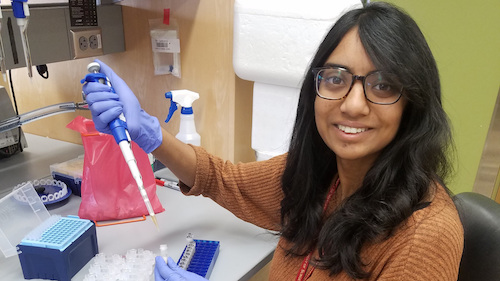
Program FAQs
How many categorical positions are available?
There are 7 categorical positions and 1 rural categorical position available each year.
Do residents participate in research time?
After their third clinical year, many residents take time away from clinical training to develop academic skills. This is typically either a one-year or two-year period of dedicated research. We offer opportunities for residents to join funded labs and work on projects in basic and translational science or clinical-based research. You can refer to the individual resident biographies to see current research interests and publications of our laboratory residents.
Academic travel is supported for residents who have their work accepted at national meetings.
What international experience does the Surgery Residency offer?
We encourage residents to seek out international opportunities and are actively developing an international rotation for residents during lab time. Current residents have spent time in Guatemala and Honduras.
What is the format of our call schedule?
The call schedules are fully compliant with the ACGME duty hour rules. PGY-1 coverage at both University and Regions hospital take the form of night float rotations. The night float PGY-1 provides coverage from Sunday evenings to Thursday evenings. For periods where the night float resident is off, coverage is split into twelve hour shifts which are covered in a rotating fashion by the remainder of the interns rotating at that site.
What is the vacation policy?
Residents are given three weeks of paid vacation, spread throughout the year as follows:
July - October: 1 week
November - February: 1 week
March - June: 1 week
In addition, all residents get 3 days off over the holidays:
December 24-26 or December 27-29 or December 30-January 1
Because PGY-1 residents start in June, they end in June (after a 52-week contract), but do not start again until July 1. Residents are paid during this break.
More information regarding our time away policy can be found online in the Resident Policy and Procedure Manual.
When is my first day on rotation?
Orientation takes place the week of June 19, 2023. Your first day on service will be June 28, 2023.
What do I need to do before residency starts?
- You must complete ACLS/BLS prior to starting internship.
- ATLS is provided to its categorical PGY-1 residents by the department during orientation.
- Visit the GME website for orientation requirements. This site contains information on new resident/fellow on-line training modules, orientation materials and program requirements.
- In addition, you will need to complete HIPPA training. Step-by-step instructions can be found online at the Privacy and Security Project Web site. Follow the left navigation link entitled “University HIPAA Training.”
- Department orientation begins the week of June 19, 2023. The purpose of our week-long G1 Orientation Program is to:
- Truly welcome you and provide you with opportunities to know us and your peers.
- Orient you to the Department’s vision, mission and values, and program.
- Ensure your success in your first few weeks on the job.
During this week, you will hear from a variety of faculty and residents, experience a “day in the life of an intern,” practice critical response and team communication skills, become familiar with the G1-G2 Core Curriculum and engage in leadership development discussions. We will also assess your current level of technical skill via a short performance exam in our simulation skills lab. And what would any orientation be without a chance to meet some Chiefs, understand your administrative responsibilities, and master the computer systems?
Welcome aboard! We look forward to having you.
Do most residents rent or buy homes?
There are many, many options for renting in the Twin Cities, from downtown to uptown to the suburbs, and ranging from houses to high-rises! Popular neighborhoods for rentals include downtown Minneapolis or Saint Paul, Dinkytown (Campus area in Minneapolis) or Uptown (Minneapolis). Average monthly rent for a 1-bedroom apartment ranges from around $600-$1000 depending on amenities and location.
Most residents buy homes within their first two years. There is a fairly even split between those who own homes versus condos, and between those who live in Minneapolis / Saint Paul proper versus the nearby suburbs.
Additional Resources:
When do I get my white coats, pager, rotation schedule, ID, etc.?
You will receive all of these materials at Orientation. Your pager will remain with you for the duration of your residency.
Should I get a parking permit?
Parking is provided free of charge to on-service residents at all sites and will be part of each hospital’s individual orientation. When you arrive for orientation on your first day, park in the Washington Avenue ramp and bring your parking card with you to be validated.
How do I set up my University of Minnesota email and Internet access?
First, check to make sure you are in the University of Minnesota system. You can do this by going to the U of MN-Twin Cities homepage at twin-cities.umn.edu. Click on Search icon.
Under Search for People, type in your name and click on Search. If you are not registered, you won’t be in the system. You should contact the Surgical Education Office at 612-626-2590 to make sure all of your paperwork is complete.
If you are registered, go to the website www.umn.edu/initiate. Enter your University of Minnesota ID number and birthday (you do not need to enter your Social Security number). You then need to setup your Internet Account Password.
To access your email account, go to:
www.mail.umn.edu
Enter your X500 ID, NOT YOUR EMAIL ADDRESS
(For example, if your email address is smith999@umn.edu, your X500 ID is smith999.)
Enter your password.
What bank do you recommend using?
There are several banks and credit unions located in and around the Twin Cities. On campus, TCF Bank is the Official Bank and offers the convenience of two campus branch locations and the most on-campus ATMs. There is also a U.S. Bank located inside the Coffman Memorial Union and Wells Fargo ATMs inside Coffman and the University of Minnesota Medical Center, Fairview.
Where can I join a good gym?
Residents have access to a variety of University of Minnesota Recreation and Wellness resources.
Additional information to campus maps, event information and other resources can be found on the University's One Stop page.
Stipend & Benefits
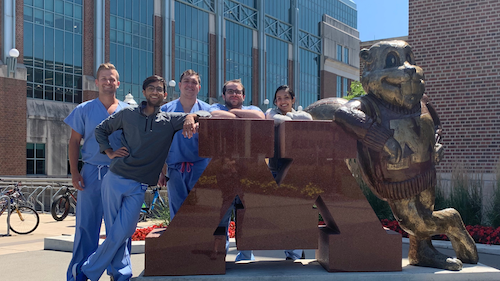
Stipends
Trainees are paid an annual stipend as stated in the Residency/Fellowship Agreement and in the program's Policy Manual. Trainees receive their stipend via a biweekly paycheck. Trainees are encouraged to use the direct deposit system, as physical checks have the potential of being lost or delayed in the mail. Paychecks are mailed or credited to bank accounts of those using the direct-deposit system on these payroll dates.
Benefits
Benefits for medical residents and fellows are managed through the UMN Office of Student Health Benefits. View the OSHB Resident/Fellow Benefits site for comprehensive information about the resident/fellow benefit package, including medical, dental, disability, and life insurance.
Additional Perks
- Lab Coats
- Pagers
- On-Site Parking at all hospitals
- Hospital meal stipends
- SCORE subscription
- Loupes before PGY-3 year
- ACS Resident membership
General Surgery Alumni
Take a look at our former General Surgery residents!
Preview our General Surgery Alumni
Verification of Training
Requests to verify a General Surgery resident's training at the University of Minnesota need to be emailed to schm2779@umn.edu or faxed to the attention of Verification Processing at 612-625-4411. For verification of subspecialty training, please contact the subspecialty directly.
To verify professional liability insurance information for a former UMN resident or fellow, find instructions on the Medical Malpractice Credentialing/Insurance Verification site.
